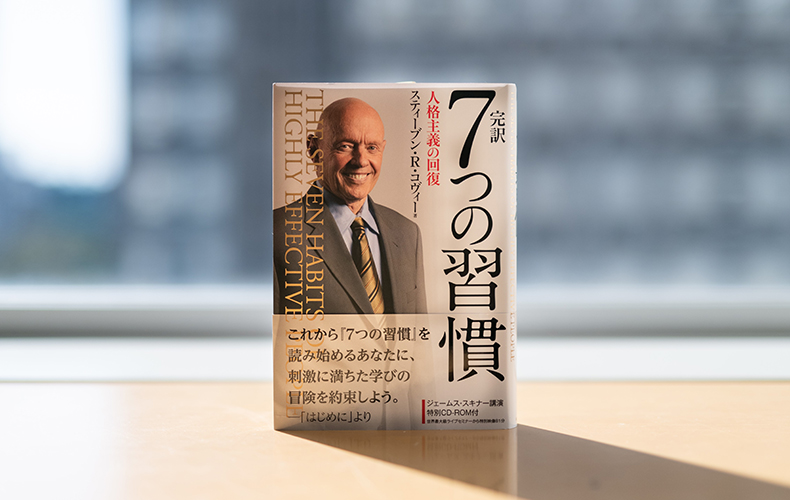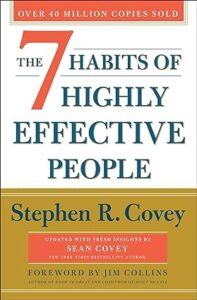In this issue, we will discuss what happens when we consider the world’s bestseller “The 7 Habits of Highly Effective People” (written by Stephen R. Covey) from a religious perspective (or “ultra-religious” or “truth-spiritual” as we call it on this website).
*First of all, this time, I dare to limit the discussion to the parts of the first to third habits (personal success).
Leaving aside religious viewpoints, there are probably many people who have read “The 7 Habits,” but don’t know how to put them to use.
In this article, we intend to decipher the “7 Habits” in a hyper-religious way to look into the depths of the “7 Habits” and furthermore, to delve into “how we can actually utilize them in concrete ways.
By the time you finish reading this article, you will understand far beyond the 7 Habits to what we are born for and what the meaning and mission of life is.
This article is about decoding the “7 Habits” from a hyper-religious perspective, but please note that this is not an article from the perspective that “Stephen Covey was actually a Mormon” or that the “7 Habits” are a new religion that smells fishy.
First, we need to grasp the logical structure of the 7 Habits in practice
Have you noticed that the seven habits are not just seven random ones, but that they are in a very logical and structured order?
The United States is a country of pragmatism, so they tend to emphasize practice over logic.
Therefore, when you read books from the U.S., there are many practical examples, such as “Caroline from Utah…” and so on. This is usually the reason why there are more pages than in Japanese books.
The 7 Habits, however, are practical, yet very logical and systematic.
Now, let’s briefly check what kind of logical structure the 7 Habits have.
Character ethic as a basic mindset
Author Covey divides his theory of success into two categories: personality ethic and the character ethic.
The differences between the two are briefly summarized below.
- Personality ethic : Success theory using small techniques
- Character ethic : Success theory based on character strengths such as integrity, honesty, diligence…
And in the 7 Habits, it is clearly declared that the latter, the ” Character ethic” is the one to be adopted.
This thought is a great answer from a hyper-religious point of view.
This is because the only thing that can be called “myself” throughout this life and the next is actually “the mind.
Upon the death of our earthly bodies, we cannot take our lands, possessions, honor…anything earthly with us into the afterlife.
Everything passes away. In Buddhist terms, it is “impermanence(all things pass away).
The only thing you can take with you to the other world is your mind. The mind is the only thing that will not be blown away by the winds of impermanence and will always be “you itself.

Therefore, a way of life that places value on things that will eventually pass away will always be empty upon the death of the body.
We should live for what will not pass away, for what has eternal value, not for what will pass away, and we are truly taking better care of ourselves if we do so.
Success, simply put, is about increasing one’s self-worth.
Of course, there may be social status and prestige involved, but these are secondary and they too will pass in time.
The various aspects of Character ethic…honesty, diligence, integrity… we could list many things, but these things are actually “attributes of God” as they have been referred to in various religions since ancient times.
Therefore, to acquire this kind of personality power oneself is to “draw closer to God,” and specifically, the effect is that one can “return to a higher spiritual realm” in the next life.
This improvement in spiritual rank and spirituality, also known as becoming a bodhisattva in Buddhism (or an angel in Christianity), is what is true success.
Again, this world is a temporary world that will eventually pass away. Our physical bodies are like avatars.
Only the heart is eternal, the real you, and only the content of the heart is the determining factor in the real theory of success: the height of the spiritual realm to which you must belong.
Therefore, although we base our theory of success on Character ethic, we can actually say that we are “successful” at the very moment we adopt Character ethic.
As is often said in Stoic philosophy, “You are the very content of what you think you are.
Also, the reason why we come all the way to this world (the phenomenal world) to be born is closely related to this point.
In the other world (the reality world), people with similar soul vibration naturally attract each other and form a certain world.
It is true that living together with others who are similar to you is much easier and literally “heavenly” compared to the phenomenal world where you meet someone you don’t like or have to leave someone you love.
However, people who carry over their negative minds to the next life still form a similar world, which is quite a painful world because “people with negative minds live together all the time.
This state is what various religions have long referred to as the “hell world.
Now, it is easy to be comfortable living with others who are similar to you, but it gradually becomes less and less stimulating and unsatisfying.
So, from time to time, we are born with physical bodies on earth.
Thanks to the physical body, people of different vibrations can meet each other.
This provides an opportunity to gain new stimulation, knowledge, and experience. It is, so to speak, the “acquisition of wisdom.

This is the meaning of being born all the way into the phenomenal world.
And we are expected to contribute to others and society with what we have in our own areas of expertise. This can be called the “practice of compassion.
Therefore, questions about various aspects of life that have been asked since ancient times can be answered here.
In simplified form, it is as follows
- Meaning of life: attainment of wisdom
- Mission of life: practice of compassion
*Reference article: Meaning and Mission of Life – What is the Most Winning Theory of Success?
And if we know the meaning and mission of our life and make the most of this life, we can return to a higher spiritual realm in the next life.
This is “true success” that penetrates the phenomenal world and the real world.
From Private Success to Public Success
The seven habits consist of “private success” from the first to the third habit, “public success” from the fourth to the sixth habit, and “habits for spiraling private and public success” in the seventh habit.
The following ideas are believed to underlie this array of theories
- Public success is only possible with private success
- Private success and public success are a spiral upward progression
Simply put, you cannot contribute to others and society (public success) if you are not able to create yourself (private success).
In Buddhism, there is a term called “self-interest and altruism.
It means that in the process of benefiting oneself (acquiring wisdom), one should also benefit others and society (practicing compassion).
Some religions start with something like “I pray for world peace,” which is a nice thing to say, but it is by no means a universal path.
It is only when you create yourself that you can contribute.
Even if you say you want to contribute to others, you cannot do so unless you have something to give.
This is also preached in the Bible.
Leave them; they are blind guides. If the blind lead the blind, both will fall into a pit.”(Matthew 15:14.)
So the sequence from private success to public success is a universal and logical sequence from a world religious perspective.
What we need to be careful of here is the danger of ending up with that for the rest of your life, saying that you have not yet achieved private success, so you cannot move on to the public success stage.
This is actually the psychology of using “I’m still in the private success stage…” as an excuse for being afraid of public success (relating to others).
Rather, if basic private success is taking shape, public success can and should be practiced simultaneously.
It is a sense that in the process of practicing self-interest, we are also performing altruism.
This is a virtuous cycle in which self-interest is further sharpened by the feedback from practice.
It is truly a spiral improvement.

However, there is no doubt that the order is still private success -> public success.
Thus, let us first keep in mind that the seven habits are in the practical logical order of “from private success to public success”.
What is the logical structure of Habits 1 – 3 (private success)
Now, let’s start with an overview of the first through third habits.
The contents of each are as follows
- Habit #1: Be Proactive
- Habit #2: Start by envisioning the end
- Habit #3: Prioritize the highest priorities
In conclusion, the logical structure of Habits 1 through 3 is as follows.
- Habit #1: Establish a starting point
- Habit #2: Define the goal
- Habit #3: Go the shortest distance from the start to the goal
When we travel somewhere, we first have a starting point, such as our home, right? Then, there is the destination (goal). After that, the route from home to the destination should be decided.

It may seem quite mundane, but you can see that this is the royal road to achieving our goals.
The above is the general logical structure of “private success.
Below, I will add individual explanations.
Habit #1: Be proactive
First, I would like to examine the first habit, ” Be Proactive”.
Why is it important to be proactive?
The synonyms of “proactive” are “passive” and “dependent,” right?
In the end, whether one is proactive or passive, one is still on the path of life.
For example, suppose there is a pebble in front of you. If this is not free, suppose it were to suddenly jump up…then it would be dangerous. You might get hurt.
In reality, however, the stones in front of you can generally be handled freely.
If you have an artistic sense, you may be able to produce some added value by painting it and making it into an object.
Thus, first of all, “what is not at one’s disposal” is a “gamble. On the contrary, “what is at your disposal” makes it possible to produce “added value.
I took the example with the object of a stone, but what about, for example, the “feelings of others”? This is not free either. Therefore, if you try to make it free, or plan your life based on it, you are still taking a “gamble.
On the other hand, “your emotions” are controllable by you. Therefore, you can produce added value.
For example, let’s say that an acquaintance has bad-mouthed you. No one feels good when someone speaks ill of them. However, the question is what kind of attitude to take.
- Talking back to bad words
- Shut up and bear it
- Capturing the learning in the bad words
At first, these three patterns are possible.
Again, the point here is “to be at your disposal or not”.
First, you have no control over what others say to you. It is outside your control. It is better to give up on what is outside your control.
On the other hand, if someone says something bad about you, you are free to make your own decision about how you “take” it. This is within your control. It is important to focus here.
To worry about such and such things that are out of one’s control is a gamble, as you have seen in the examples I have just given you.
So here, the first thing to think about is, “What is within my control? What is within your control is “How can I take their words and make them positive or at least not negative for me?
Let us recall the ultra-religious interpretation of “Character ethic.
The only thing that can truly be said to be you through the phenomenal world and the real world is “only the mind”. In short, the value of the mind determines your value. The value of your mind equals your value.
Therefore, the point is what kind of attitude and what kind of mind you have when others speak ill of you. Our own mind is within our own control.
If your value is what your heart is, then the following is true.
Your self-worth as a person is determined in the following three ways
- Where you speak ill back: You are a person who speaks ill back when you are spoken ill of
- If you endure in silence: You are a person who endures in silence when someone swears at you.
- If you have drawn learning from the swearing: You are a person who learns from bad words even if they are said to you.
If you look at it dispassionately, you will see which of the above three ways is more admirable, more God-like, or in other words, “the way to raise your spiritual rank.
Yes, first of all, the person who speaks ill of others is “a person who speaks ill of others. Here, he is distancing himself from God, lowering his self-worth and spiritual rank.
When a person speaks ill of others, he or she is committing a “failure” by “bringing about a decline in spiritual rank. In this sense, the moment one speaks ill of another, he or she is already receiving retribution.
On the other hand, those who know “where their true value lies” will choose the third option, “try to learn from the bad words,” even if they are spoken ill of.
And, indeed, he or she will gain the self-worth of “a person who tries to learn from bad words even when others speak ill of him or her,” and at that moment, he or she will have improved his or her spiritual rank and will have received a good reward.
Returning to the Seven Habits, in the first habit, Covey uses the terms “circle of interest” and “circle of influence” to describe it.
To succeed is also to create (create) one’s own life. And in order to create, the material must be something that can be handled freely (something in the circle of influence).
In other words, it must be able to act independently. This is the starting point for everything.
So, in ultra-religious terms, a passive attitude, the idea of “what God can do for me” is not good enough, but rather, a proactive attitude of “what I can do for God’s ethical world order” is essential.
The difference is whether it is self (ego)-centered or divine reality-centered. This is really about as different as the difference between heavenly motion and earthly motion.

Each of these is categorized on our website (in Neo Buddhism) as follows
Ego-centered worldview: Witchcraft Spirituality
Divine reality-centered worldview: Truth Spirituality
Needless to say, for personal success, one should choose the latter, Truth Spirituality.
Here in the 7 Habits, it is described as “principle-centered”. The actual meaning is almost the same.
Habit #2: Start by envisioning the end
Reclaiming the originality of life through the “Forerunner of Death”
Even though we know that death will come someday, it is difficult for us to realize it. This is especially true for younger people.
We are in a sensory illusion that somehow our current life will go on forever.
When we are in such a state, it is difficult to think about spending our limited time in a meaningful way, and it is also difficult to have a chance to think seriously about what we should do in this time in our lives.
And in the midst of our busy lives, we are buried in the mundanity of time passing by somehow. I call this “daily pressure.
People can be frustrated by major events, but in fact, for many people, it is this ” daily pressure” that causes them to be swept away by mediocrity.
It is only when we foresee “death” that we begin to think about our own unique mission and how to make the most of our finite (this life).
The philosopher Heidegger said something to the effect that “man regains his original nature through the pioneering awareness of death.
On the other hand, if we are unaware of this, we live in a state of “non-genuineness,” where our days pass by aimlessly, indulging in empty talk.
In Buddhism, Buddha also makes it a primary preaching principle to begin with the recognition that “birth, aging, sickness, and death” are truths (*The Noble Eightfold Path of the Four Noble Truths).
So here, too, the paradox is preached that by recognizing death, one regains one’s original life.
In the West, there is a proverb called “Memento Mori,” or “Never forget death,” about realizing one’s true life to the fullest by recognizing death.
This is where the third habit, “Begin by envisioning the end,” becomes necessary.
In “The Seven Habits,” the trick to “start by envisioning the end” is to “picture the scene at your own funeral and imagine what you would like the attendees to say.

(In English translation in progress)











Comments